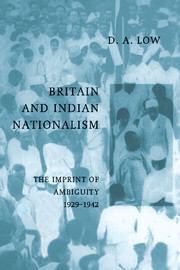Book contents
- Frontmatter
- Contents
- Maps
- Preface
- List of abbreviations
- 1 Introduction: contemporary encounters
- 2 Vortex debate: the purna swaraj decision 1929
- 3 Holds barred: anatomy of a satyagraha, Lucknow, May 1930
- 4 Peace with conflict: the Gandhi–Emerson talks, March–August 1931
- 5 Thrust and parry: the Mahatma at bay, 1932–1933
- 6 Which way ahead? Nehru and Congress strategy 1936–1937
- 7 The spider's web: Congress and provincial office 1937–1939
- 8 Working with the grain: Sir Tej Bahadur Sapru and the antecedents to the Cripps Declaration 1942
- Biographical notes
- Index
2 - Vortex debate: the purna swaraj decision 1929
Published online by Cambridge University Press: 13 October 2009
- Frontmatter
- Contents
- Maps
- Preface
- List of abbreviations
- 1 Introduction: contemporary encounters
- 2 Vortex debate: the purna swaraj decision 1929
- 3 Holds barred: anatomy of a satyagraha, Lucknow, May 1930
- 4 Peace with conflict: the Gandhi–Emerson talks, March–August 1931
- 5 Thrust and parry: the Mahatma at bay, 1932–1933
- 6 Which way ahead? Nehru and Congress strategy 1936–1937
- 7 The spider's web: Congress and provincial office 1937–1939
- 8 Working with the grain: Sir Tej Bahadur Sapru and the antecedents to the Cripps Declaration 1942
- Biographical notes
- Index
Summary
What is required is some facade which will leave the essential mechanism of power in our hands.
Lord Irwin, Viceroy of India, 30 July 1929On 31 December 1929, at Mahatma Gandhi's instance, and under Jawaharlal Nehru's presidency, after two years of constant discussion and often heated debate, the Indian National Congress at its Lahore session took two of the most momentous decisions in its history. It confirmed that henceforward its objective would not be Dominion Status within the British Commonwealth, but purna swaraj, complete independence. It also authorised the All India Congress Committee, ‘whenever it deems fit, to launch upon a programme of civil disobedience’ under Mahatma Gandhi's leadership so as to bring British rule in India to an end. Thereupon there ensued between 1930 and 1934, with an interval during 1931, the most widespread and prolonged confrontation between the forces of Indian nationalism and the British Raj that ever occurred.
On the day after the great decisions had been taken, Jawaharlal Nehru, in his capacity as President of the Indian National Congress, received the following letter from one of his most respected predecessors, Pandit Madan Mohan Malaviya. This ran:
As I do not agree with the resolution passed by the Congress yesterday relating to its policy and programme, I think it is due to the Congress and myself that I should not continue to be a member of its Working Committee.
- Type
- Chapter
- Information
- Britain and Indian NationalismThe Imprint of Amibiguity 1929–1942, pp. 41 - 71Publisher: Cambridge University PressPrint publication year: 1997
- 1
- Cited by



